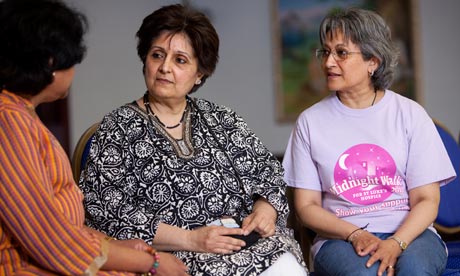
Nine years ago, Bharti Patel discovered a lump in her breast. She was 47 years old. "Breast cancer changes you," she says slowly, running one hand through her short, streaked hair. "It affects what you wear, what you look like, who you are."
Now, at 56, she is a breast cancer survivor and finally moving on. This summer, she is going to live in an ashram in northern India for two months. "I've come on in leaps and bounds since the cancer," she says. "I've forgiven people. I've done so much. I've changed my life."
Like many women with breast cancer, Patel was physically and emotionally exhausted by her treatment. But the loneliness such strains can bring was exaggerated by what Patel describes as cultural barriers.
"One of the biggest taboos of Asian culture is that if you are ill, you just don't talk about it," she says. "You don't talk about your breast cancer to the outside world. You don't even say the word 'breast'. It's just too private."
While waiting for her radiotherapy treatment one day, she saw a poster for Cancer Black Care, a support group for black and ethnic-minority patients. She called them, explained her Indian heritage and that she was hoping to meet someone of a similar background. A few days later, she was given the number of Pushpa Martin, an Indian woman who, like Bharti, had been searching for other Asians with breast cancer. "We spoke for hours on the phone, before we'd even met," says Patel.
A medical researcher based at Northwick Park, the hospital in Harrow which treated Patel, invited the women to a group interview for her thesis on post-cancer treatment. Amarjit Panesar also attended and the three hit it off. Together, they founded the Asian Women's Breast Cancer Group, based in Kenton, north London, holding their first meeting in October 2003. News of the group spread quickly via word of mouth and leaflets. Now there are more than 50 members, who meet each month at a local Hindu temple to share their experiences.
Historically, south Asian women were considered to be at a very low risk of breast cancer compared with white women. Doctors put it down to a combination of lifestyle factors common to the Asian subcontinent, including a tendency to have large families at a young age and to breastfeed for long periods.
But last year a study conducted by Dr Anne Stotter, consultant breast surgeon at Glenfield hospital, Leicester, concluded that south Asian women can no longer be considered at a reduced risk, estimating that the number of Asian women being diagnosed with breast cancer has more than doubled since 1998, from 60 to 130 women per 100,000 Asian women every year.
A national study into south Asian women and breast cancer is currently being undertaken by Cancer Research UK. "The trend is for an increased diagnosis of breast cancer nationally in south Asian women," Stotter says.
Yet encouraging breast awareness among first-generation Asian women remains a challenge, says Lester Barr, consultant surgeon and chairman of the cancer-prevention charity Genesis. Recent research by Genesis found that Asian women are only half as likely as non-Asians to attend life-saving breast screening tests. Last October, the charity launched its own support group for Asian women in Manchester.
"The low uptake in screenings may be because of an assumption that this is a white woman's disease," says Barr. "But it may also have to do with cultural attitudes, for instance not wanting to see a doctor about any intimate health problems. Traditionally, when an Asian woman gets breast cancer, she tells no one. We need to change that."
Back in Kenton, the meeting is in full swing. Patel and Panesar originally sat on the group's committee, but have stepped down when Martin died from secondary cancer in 2008. The present chairwoman, also named Bharti Patel, is busy arranging copies of the latest group newsletter which is full of photos of events including a laughter-therapy session and comedy night. She smiles even as she tells me she has battled with cancer (first Hodgkin's lymphoma as a 24-year-old, then breast cancer as a 46-year-old) for nearly half of her life: "When I got the cancer again, I thought why me? But I carried on."
The women arrive, some in saris and matching bangles, others more low key. Dr Nihal Shah, a consultant oncologist, is the evening's guest speaker. "To have a young Asian man here to talk about breast cancer so openly is a huge deal," says the group's chairwoman.
Chanchalben Chauhan, 73, comes to every meeting. She found what she thought was a bruise, later confirmed as a lump, while practising yoga. Speaking in Hindi (her granddaughters translate for her with doctors), Chauhan says she did not tell her friends about the cancer. "If I had, they would have worried me. I didn't want that. I didn't feel like I had cancer. I mean, I know I have to go one day. But I just didn't want them all to know."
Similarly, Deviben Patel, 63, didn't tell anyone outside of her family about her breast cancer. "I wore my wig and kept it a secret for a year," she says. "But here I can talk about it all."
Ranju Morjaria, 60, nods. "My niece had breast cancer before me. So when I was diagnosed, I took a lot of strength from her. She told me you have to be open and be honest about it. Tell everyone, don't hide it. And that really helped me to get through."

